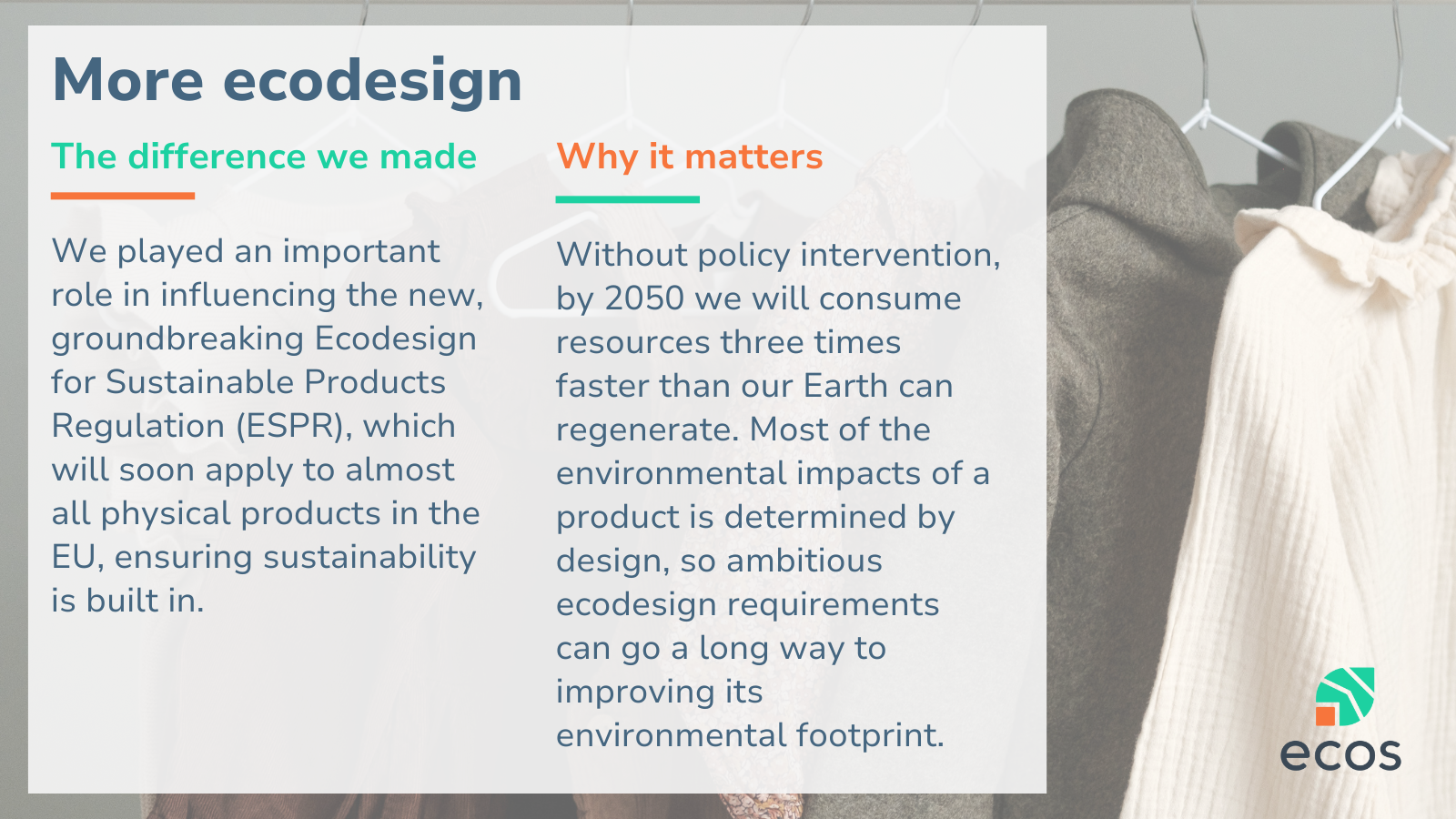The ecodesign revolution is here
We need sustainable products to be the norm – a long-standing priority for ECOS. To reduce wasted resources and limit the impact products have on the environment at every stage of their lifecycle – short-lived, disposable, toxic, and unrepairable items must become a thing of the past. Enter ecodesign.

We have campaigned for many years to expand the ecodesign framework to all products, advocating for wider and better ecodesign rules based on the successful Ecodesign Directive from 2009, which significantly reduced the environmental impacts of everyday appliances by incentivising more energy and resource efficient products while pushing the worst-performing ones off the market.
Midway through 2020s, we finally see this ambition realised. The ESPR activates a new era for sustainable products. Ambitious ecodesign rules will phase out polluting goods and mandate that manufacturers consider the environment. In doing so, it will have a wide-reaching impact on global value chains, applying to any company placing products on the EU market.
EU ecodesign regulation – years in the making, now in force
Negotiations for the Ecodesign for Sustainable Products Regulation (ESPR) concluded late in December 2023, more than four years since ECOS first campaigned for ecodesign principles to apply to all sectors and products. In July 2024, the Regulation entered into force, putting into motion the next steps of this important framework.
Throughout 2024, ECOS was very active in this process. We fought hard for a ban on the destruction of unsold clothes and shoes to be part of this legislation. To use scarce resources in a product and then needlessly destroy it represents the most wasteful scenario conceivable in any economy – let alone a circular one. Destroying unsold goods wastes all the value generated and resources used in production – energy, materials, labour, craftmanship – and skips the use phase entirely. Thanks to our successful advocacy for this ban, the ESPR will prohibit the wasteful destruction of unsold clothing and footwear from July 2026, paving the way for similar restrictions on other product categories, such as electronics.
For the ESPR to successfully bring us closer to planetary boundaries, the material footprint and resource use must be dramatically reduced. The ESPR’s objective is to improve the sustainability of products, which ultimately means to reduce raw material extraction for products consumed in the EU. Through our advocacy in 2024, we manged to ensure material footprint is mentioned within the ESPR text. We worked with other NGOs to push for a sustainable resources management framework, resulting in a positive reference in the 8th EU Environmental Action Programme Council Conclusions.
Securing ecodesign regulation that will make a difference
In 2024, our preparations began in earnest for the formation of the Ecodesign Forum and the first working plan for ecodesign requirements of priority products. A snapshot of the highlights includes:
- Preparatory studies on iron and steel and textiles are ongoing. Led by the European Commission, in consultation with various stakeholders – we have been providing input every step of the way and in some cases, we are the only NGO at the table. By participating in the preparatory studies ECOS provides input at the earliest stages of the ESPR process, and helps to establish environmental ambition. In 2024, the Commission referenced our work on textiles in the draft preparatory study, and we are looking forward to this document being officially adopted.
- The newly established Ecodesign Forum will be key to a successful implementation of the ESPR. It offers stakeholders a say in the development of delegated acts mandated by the Regulation, such as on textiles, steel, furniture, tyres, and other sectors. In the spring of 2024, we published our recommendations to ensure that the decision-making process of the Ecodesign Forum remains fair and transparent. As a well-established ecodesign expert, ECOS was granted a seat within the Ecodesign Forum, and will continue to push for ambitious and effective ecodesign requirements.
- The first ESPR Working Plan, currently in the making, covers the first five years of the regulation implementation, and will include a priority list of sectors to address. Pushing for ecodesign for plastic to be prioritised, we continue to advocate that this impactful sector is addressed, as we have done ever since the launch of our impactful 2019 study on the topic. Subsequent ESPR working plans will address additional sectors, or could even intervene when sector-specific legislation fails to deliver. This could be the case for one of our long-standing priorities: construction products. We are closely monitoring the Construction Products Regulation, readying ourselves to support ecodesign intervention.
Making an impact with ecodesign
It will take time to bring the ESPR to life and (re)design products that do not meet the high ambition of this legislation, but the EU has finally laid the foundations for a new era of sustainable design.
Ultimately, the success of the initiative will depend on its implementation, including the important role of standardisation. Prioritising products and horizontal measures will be key to avoid potential delays and ensure that the most polluting products are dealt with first. This needs to be combined with effective market surveillance and enforcement.
The ESPR will ensure that making design choices based on environmental considerations is self-evident. Sustainability must be built into a product’s whole lifecycle and design – and the new regulation will make this happen on an extensive, unprecedented scale, contributing to the EU’s climate and energy goals.
We will continue to be there every step of the way.


